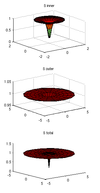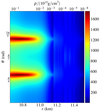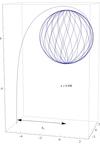Maple
For queries about this topic, contact Sam Dolan.
View the calendar of events relating to this topic.
Projects

Efficient algorithms for liquid crystal alignment
Giampaolo D'Alessandro, Timothy Sluckin (Investigators)
We have developed an efficient algorithm to determine the liquid crystal alignment in the absence of defects. The aim of this project is to extend this algorithm to include defects.

Numerical Elastic Neutron Stars
Ian Hawke, Ian Jones (Investigators), Andrew Penner
We study the astrophysical effects of the crust on a neutron star using an elasto-hydrodynamic model.

Self-Force and Black Hole Inspirals
Sam Dolan (Investigator)
We use IRIDIS to compute the self-force acting on a solar-mass black hole orbiting a supermassive black hole.

Vertical turbulence structures in the benthic boundary layer as related to suspended sediments
Hachem Kassem (Investigator), Charlie Thompson
There is a genuine need for better, more robust modelling of suspended sediment transport in the coastal zone, both to understand its morphological evolution and it's impact on biogeochemical cycling, ecosystems services and to guide engineering applications such as dredging and defence schemes against erosion and flooding.
The suspension of sediment in turbulent flows is a complex case of fluid-particle interaction, governed by shear stresses (momentum exchanges) at the bed and within the benthic boundary layer (BBL). The intermittent transfer of momentum is a manifestation of coherent turbulent vortex structures within the flow. The passage of such structures (or clusters of) is often related to perturbations of bottom sediment, which may be entrained and maintained in suspension if sufficient turbulent energy is provided. The first part of my PhD investigated the temporal and scale relationships between wave–generated boundary layer turbulence and event–driven sediment transport in oscillatory flow in the nearshore. This involved complex statistical, spectral, quadrant and wavelet analysis of high frequency nearshore measurements of turbulence and suspended sediments (medium sand), collected as part of the EU-funded Barrier Dynamics Experiment II (BARDEX II). The following step aims to develop a 3D numerical model in OpenFOAM which would reproduce the fine scale turbulence structures observed over a fixed rippled bed in oscillatory flow. The 3D velocity field, turbulent components, correlations (stresses) and quadrant structures will then be linked to observed sediment resuspension events. The model will be validated against a set of laboratory experiments undertaken at the Fast Flow Facility at HR Wallingford.
People
 Timothy Sluckin
Timothy SluckinProfessor, Mathematics (FSHS)
 Giampaolo D'Alessandro
Giampaolo D'AlessandroReader, Mathematics (FSHS)
 Nicolas Green
Nicolas GreenReader, Electronics and Computer Science (FPAS)
 Tiina Roose
Tiina RooseReader, Engineering Sciences (FEE)
 Ian Hawke
Ian HawkeLecturer, Mathematics (FSHS)
 Ian Jones
Ian JonesLecturer, Mathematics (FSHS)
 Dina Shona Laila
Dina Shona LailaLecturer, Engineering Sciences (FEE)
 Anatoliy Vorobev
Anatoliy VorobevLecturer, Engineering Sciences (FEE)
 Charlie Thompson
Charlie ThompsonSenior Research Fellow, Ocean & Earth Science (FNES)
 Felipe Alves Portela
Felipe Alves PortelaResearch Fellow, Engineering Sciences (FEE)
 Nicola De Tullio
Nicola De TullioResearch Fellow, Engineering Sciences (FEE)
 Sam Dolan
Sam DolanResearch Fellow, Mathematics (FSHS)
 Btissam Er-Rahmadi
Btissam Er-RahmadiResearch Fellow, Management (FBL)
 Hachem Kassem
Hachem KassemResearch Fellow, Ocean & Earth Science (FNES)
 Nina Podoliak
Nina PodoliakResearch Fellow, Physics & Astronomy (FPAS)
 Patrick Bechlars
Patrick BechlarsPostgraduate Research Student, Engineering Sciences (FEE)
 Jean Claus
Jean ClausPostgraduate Research Student, Engineering Sciences (FEE)
 Joseph Egan
Joseph EganPostgraduate Research Student, Mathematics (FSHS)
 Stuart George
Stuart GeorgePostgraduate Research Student, Mathematics (FSHS)
 James Harrison
James HarrisonPostgraduate Research Student, Engineering Sciences (FEE)
 James Heppell
James HeppellPostgraduate Research Student, Electronics and Computer Science (FPAS)
 William Hurndall
William HurndallPostgraduate Research Student, Electronics and Computer Science (FPAS)
 David Lusher
David LusherPostgraduate Research Student, Engineering Sciences (FEE)
 Richard Pichler
Richard PichlerPostgraduate Research Student, Civil Engineering & the Environment (FEE)
 Jess Jones
Jess JonesTechnical Staff, iSolutions
 Petrina Butler
Petrina ButlerAdministrative Staff, Research and Innovation Services
 John Muddle
John MuddleAlumnus, Mathematics (FSHS)
 Andrew Penner
Andrew PennerAlumnus, Mathematics (FSHS)
 Doroteya Staykova
Doroteya StaykovaNone, None